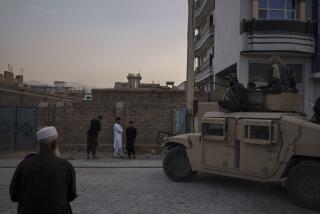Visit to Pakistan by CIA officer reported
- Share via
WASHINGTON — In a demonstration of growing U.S. frustration, the CIA’s deputy director flew to Islamabad this month to warn Pakistani officials that they need to do more to address dangerous ties between the country’s spy agency and resurgent Al Qaeda-linked militants, a U.S. official said Tuesday.
Pakistan’s powerful Inter-Services Intelligence agency has long been accused of arming, training and sponsoring the Taliban and affiliated Islamic extremists, first in Afghanistan and more recently in Pakistan, and of using them as proxies in Afghanistan and the disputed territory of Kashmir.
But the visit by Stephen Kappes marked a significant escalation of those U.S. concerns, and was carried out before this week’s visit to Washington by Pakistani Prime Minister Yusaf Raza Gillani, according to one senior U.S. official who confirmed the trip.
The official said Kappes was part of a small delegation headed by Navy Adm. Michael G. Mullen, chairman of the Joint Chiefs of Staff. A Pakistani official who declined to discuss details also confirmed Kappes’ trip, first reported on the New York Times’ website Tuesday night.
Kappes, a longtime and much-respected veteran of the clandestine side of the CIA, met separately with Gillani, President Pervez Musharraf, influential army chief and former ISI head Gen. Ashfaq Kayani and the current head of the ISI, Lt. Gen. Nadeem Taj, the U.S. official said.
Gillani downplayed U.S. concerns about ties between the ISI and the militants Tuesday evening, and said that the intelligence agency was operating under tight supervision by the new civilian government.
Several U.S. counter-terrorism officials, however, said in interviews this week that they were deeply skeptical of the Pakistani prime minister’s assurances, and that they believed he and his new government lacked any real authority to tell the powerful ISI and its military leaders what to do.
All of the officials spoke on condition of anonymity, citing the diplomatic sensitivity of Kappes’ visit and the accusations against the ISI.
Kappes’ meetings were not the first time that U.S. officials have confronted Pakistan over the ties between the ISI and the Taliban.
But U.S. officials said they were worried that the relationship has intensified in recent years, in part because Pakistan feels threatened by archrival India’s aggressive efforts to establish a presence in Afghanistan, the U.S. counter-terrorism officials said.
“It’s not clear to us” whether the ties have intensified in recent months as Pakistani Taliban members have taken over large swaths of the tribal areas, the U.S. official familiar with Kappes’ visit said. “We just know that they’re there.”
--
More to Read
Sign up for Essential California
The most important California stories and recommendations in your inbox every morning.
You may occasionally receive promotional content from the Los Angeles Times.










